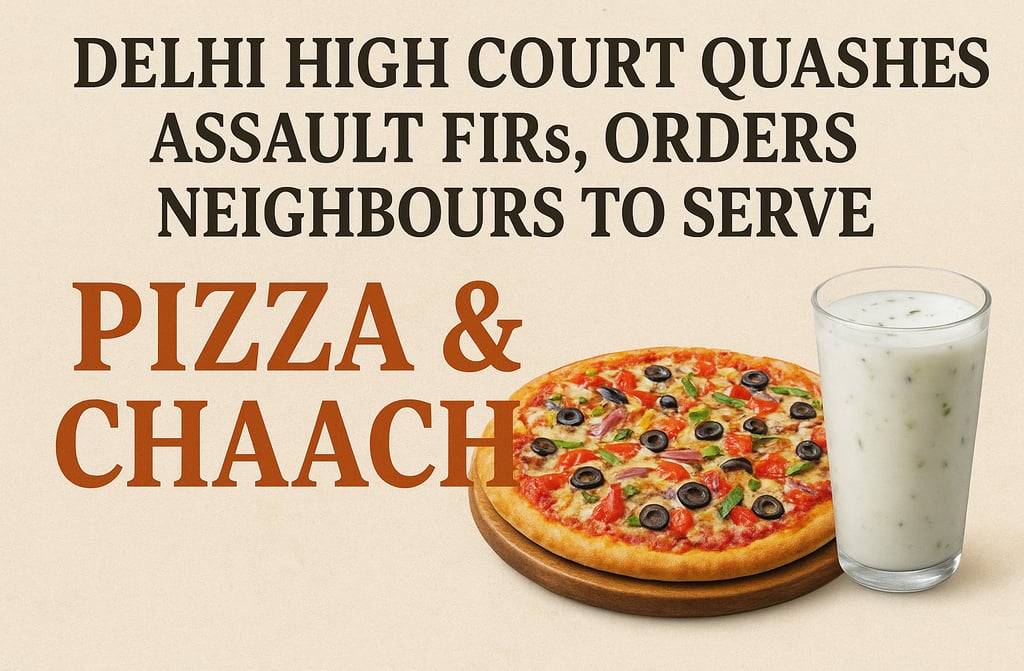Delhi High Court’s Unusual Punishment: FIRs Quashed, But Parties Ordered to Serve Pizza & Chaach
Delhi High Court quashes assault FIRs, orders neighbours to serve pizza & chaach to Ashram inmates—restorative justice with a twist.
Adv Sachin Gupta | Partner | Altius Astra Attorneys
9/23/20252 min read


In a quirky yet impactful move, the Delhi High Court has quashed two assault-related FIRs—but not without an unusual twist. Justice Arun Monga directed the feuding neighbours to serve Amul Chaach and vegetable pizzas to Ashram inmates as part of community service. This ruling has sparked conversations around restorative justice, alternative dispute resolution, and the evolving role of courts in ensuring societal harmony.
A Pizza & Chaach Order From the Bench
The case, titled Arvind Kumar & Others v. The State and Another, revolved around two FIRs filed by neighbours in Delhi after a heated quarrel—reportedly over the handling of their pets—spiraled into physical assault allegations.
Instead of allowing the criminal proceedings to drag on, the Court stepped in with a refreshing perspective. Justice Monga noted that continuing the FIRs would “serve no useful purpose” and risk rekindling hostility between the neighbours, while quashing them would “promote cordiality and bonhomie.”
But the quashing came with strings attached: both parties must jointly provide pizzas and Amul Chaach to every resident, attendant, and staff member at Sanskar Ashram, Dilshad Garden. The order even ensured quality control, directing the Investigating Officer to confirm that the pizzas matched the menu provided.
At first glance, this judgment might sound amusing. After all, what do pizzas and buttermilk have to do with justice? But dig deeper, and the Delhi High Court’s decision reflects a larger shift towards community-oriented dispute resolution.
Restorative Justice in Action: Instead of punishment that alienates, the Court opted for an act of goodwill that benefits society.
Promoting Social Harmony: By asking the warring neighbours to contribute to a shared cause, the Court aimed to mend not just their relationship but also extend kindness to vulnerable communities.
Practical Approach: Courts are burdened with minor altercations escalating into prolonged criminal cases. This ruling avoids clogging the system while still ensuring accountability.
In other words, the Delhi High Court’s pizza-and-chaach order is not just symbolic—it underscores the judiciary’s commitment to innovative remedies that go beyond traditional fines and imprisonment.
This isn’t the first time Indian courts have turned to creative community service orders:
In previous cases, offenders have been asked to plant trees, donate to charitable causes, or clean public spaces.
Such orders reflect the judiciary’s belief that justice must also carry a reformative and reconciliatory edge, particularly in minor disputes.
The Supreme Court too has highlighted that compromise-based quashing of FIRs is permissible in matters that are overwhelmingly private in nature, provided no serious crime against society is involved.
Here, both parties had reached a settlement, making it a classic case for compromise. Yet, the Court added a social dimension—ensuring that the resolution touched lives beyond just the litigants.
Could this ruling pave the way for more imaginative sentencing in India? Possibly. As society evolves, the justice system faces pressure to balance punishment with reconciliation, deterrence with reform.
Imagine this: instead of paying fines to the State, what if petty offenders were ordered to donate school supplies, serve meals at old-age homes, or contribute to public health initiatives? Such measures not only resolve disputes but also strengthen the social fabric.
The Delhi High Court’s order might just be a step in that direction.
The pizza-and-chaach ruling may raise eyebrows, but it also raises hope—that justice can be empathetic, community-driven, and forward-looking.
Will we see more such judgments where kindness replaces conflict? Only time will tell. But one thing is certain: this case will be remembered as a moment when the Delhi High Court served not just justice—but also a slice of pizza with a glass of buttermilk.
Altius Astra Attorneys
A premier law firm based in Delhi, India, offering legal representation across various practice areas for citizens rights and interests.
© 2025. Altius Astra Attorneys. All rights reserved.
Contact Us
📞 9899290789, 9818786756
📧 contact@altiusastra.com
3C-ED Block, Madhuban Chowk, Pitampura, Delhi-110034
DISCLAIMER
